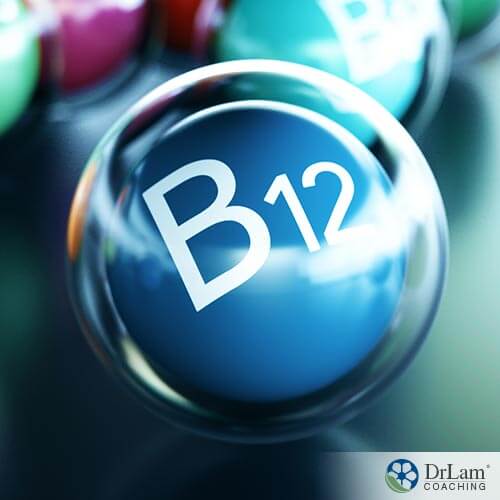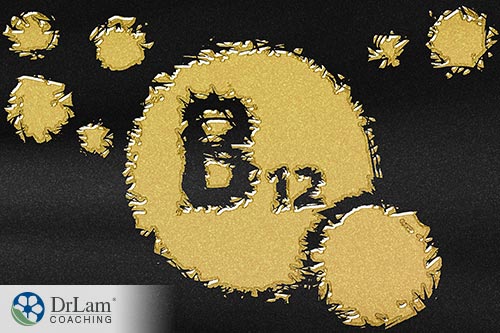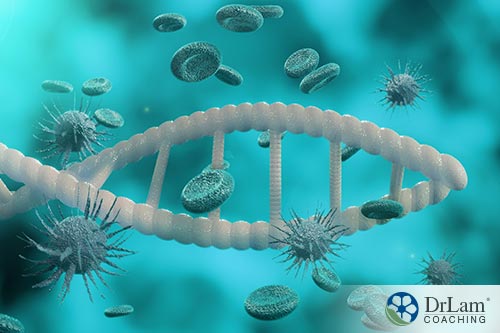Vitamin B12 deficiencies are very common these days as the modern diet fills up with poor food choices. If you have a deficiency, then it’s important that you look into improving your diet or supplementing. Unfortunately, it’s not as simple as buying a tablet and taking it every day. There are four different types of vitamin B12 sources. And which one you take will have an important impact on your overall health and wellbeing.
 Vitamin B12, also known as cobalamin, is one of the most common deficiencies in the world at the moment. It’s a water-soluble vitamin also that’s essential for your brain, for DNA synthesis, and red blood cell creation. If you’re deficient in this vitamin, you may find yourself with symptoms such as:
Vitamin B12, also known as cobalamin, is one of the most common deficiencies in the world at the moment. It’s a water-soluble vitamin also that’s essential for your brain, for DNA synthesis, and red blood cell creation. If you’re deficient in this vitamin, you may find yourself with symptoms such as:
Some good sources of vitamin B12 are fish like salmon or cod, meat, eggs, cheese, milk, and some fortified cereals. Whether you’re taking this vitamin in food or supplements, you need to know about the types of vitamin B12 that you’re taking. Because these will differently impact your health.
There are four different types of vitamin B12. They’re each available in different forms and have different benefits in the body. They are:
Methylcobalamin is the most natural form of vitamin B12. You can take it in supplements and or find it occurring naturally in food like eggs and milk. This form helps create methionine and S-adenosylmethionine. It’s also essential for red blood cell formation, DNA synthesis, myelin integrity, and the proper functioning of neurons in your brain.
The second type is cyanocobalamin, which is a synthetic form of vitamin B12 that isn’t found in nature. It contains a cyanide molecule and is often found in vitamin B12 supplements because it’s more stable and cost-effective than other types of vitamin B12. Cyanocobalamin is converted in the body to adenosylcobalamin or methylcobalamin, both of which are the two active forms of vitamin B12.
Hydroxocobalamin is another form of vitamin B12 and is sometimes known as vitamin B12a. It’s found in food and supplements and is a member of the cobalamin family. Your body needs this vitamin B12 form to manufacture DNA. Hydroxocobalamin may last longer in the bloodstream than cyanocobalamin, which means it may be a more effective supplement.
Adenosylcobalamin is essential for fat and amino acid metabolism and helps create myelin, which protects your nerve cells. It’s the mitochondrial form of B12 and found in cellular tissues. However, it’s the least stable of the B12 vitamins and can be hard to find in tablet form.
 The biggest difference between these four types of vitamin B12 is their absorption and retention in the body. Unfortunately, the research into this vitamin is incomplete, so it’s impossible to tell definitively which form is better for your body. Current evidence suggests that:
The biggest difference between these four types of vitamin B12 is their absorption and retention in the body. Unfortunately, the research into this vitamin is incomplete, so it’s impossible to tell definitively which form is better for your body. Current evidence suggests that:
Another important issue is conversion. Once the vitamin is in your body, it must be converted into the active forms that are essential to your health. The three more natural types of vitamin B12 require less conversion, so maybe more beneficial than cyanocobalamin, which has to be converted into a useable form.
However, if you’re struggling with deficiencies, then it’s worth looking into supplementing with different types of this vitamin to ensure that your body is getting everything it needs to function properly.
Vitamin deficiencies cause stress. They mean that your body will struggle to perform its normal, essential functions and can directly affect the health of organs and cells. This type of stress is very dangerous as it can add to the stress you’re already under and cause your adrenal glands to fatigue.
When you’re under stress, your adrenal glands produce high levels of cortisol, which is an essential part of the NeuroEndoMetabolic (NEM) stress response. Cortisol causes changes in all the circuits in your body, basically causing some to become overactive and others to slow down until the stress is relieved. When you experience chronic stress, however, this period of rest after a stressful time doesn’t happen. Chronic stress is all too common and is one of the biggest causes of disease in the world at the moment.
It can also result in Adrenal Fatigue Syndrome (AFS), which occurs when your adrenals start to struggle with the high demand for cortisol and can even start to break down. This is a very dangerous condition, all the more because it isn’t fully understood or acknowledged by the medical establishment. As a result, many people with AFS spend a lot of time feeling unwell without an apparent cause.
If you have AFS, then you must identify and eliminate the causes of stress to alleviate the pressure on your adrenal glands. And one of the best and easiest ways to do that it by identifying and correcting deficiencies. This is where the four types of vitamin B12 could be very helpful as they may help correct deficiencies and rebalance the Detoxification Circuit.
The Detoxification Circuit includes the immune system, the extracellular matrix (ECM), and the liver. These three components work together and separately to deactivate and expel metabolites. The metabolites are the product of metabolism. These metabolites are produced when your body breaks down substances or is exposed to external or internal toxins.
The problem comes when you’re exposed to too many toxins. This produces an overload of metabolites and your Detoxification Circuit can start to struggle with its work. If you have adrenal fatigue, your system may be flooded with metabolites because of overexposure to toxins like poor dietary choices, environmental toxins, and even bad habits like poor sleep. The liver can become overloaded with metabolites, which leaves them circulating and congesting the ECM. This activates the immune system, which produces inflammation to get rid of the toxins. And in turn, this creates more metabolites and increases liver overload and ECM congestion.
As you can see, this can be a downward spiral of poor health and toxic overload. And vitamin deficiencies can add to that. They will cause stress to your body overall as well as troubling symptoms. And this will result in more metabolites that can overwhelm your Detoxification Circuit.
However, if you choose to supplement to correct this deficiency, then you may cause additional problems for yourself because of the differences between the types of vitamin B12.
 If you decide to supplement with B12 vitamins, then you must understand what this could do to your body, particularly if you have a COMT mutation or MTHFR mutations. These are both gene mutations that are involved in the methylation pathway and in the way your body absorbs and processes specific molecules. This is important when you’re deciding between the different types of vitamin B12.
If you decide to supplement with B12 vitamins, then you must understand what this could do to your body, particularly if you have a COMT mutation or MTHFR mutations. These are both gene mutations that are involved in the methylation pathway and in the way your body absorbs and processes specific molecules. This is important when you’re deciding between the different types of vitamin B12.
If you have a COMT mutation, then taking methylated vitamins may not be the best for your body. This mutation will make it difficult for your body to break down the vitamins and cause additional stress to your Detoxification Circuit that can result in a greater metabolite build-up. If you have MTHFR mutation, on the other hand, you might need more methylated B vitamins. However, if you have both COMT and MTHFR mutations you have to be careful in juggling what type of B12 your body takes. Over and under methylating can both worsen your Detoxification Circuit overload and the associated malfunctions.
This means you need to be careful about choosing the right types of vitamin B12 forms if you have these gene mutations. This will help you avoid additional stress and the worsening of your AFS. So, if you have a COMT mutation, make sure that you avoid the methylcobalamin form of vitamin B12. Ask your doctor about the adenosylcobalamin and hydroxocobalamin forms instead. It is best to find someone experienced in dealing with AFS to help guide you through the process. Especially if you have a very sensitive body then taking B vitamins might end up making you worse instead of what it is meant to do. It has to be taken as the proper time with the proper dosing and type.
We have two recommendations for those seeking a vitamin B12 vitamin.
Hydroxo B12 contains hydroxocobalamin. This form of vitamin B12 easily converts into methylcobalamin and is especially well tolerated by those having issues with a pre-methylated B vitamin.
LipoNano MTHFR, on the other hand, is a supplement containing methylcobalamin, an active form of vitamin B12 supporting cognitive function, energy production, homocysteine regulation, and your body’s ability to produce energy. It also contains methyl folate, an active form of folate that plays a part in growth and cellular repair while supporting certain neurological processes. Liponano MTHFR also utilizes a cutting edge delivery method using liponano technology. By enclosing a supplement in a phospholipid, you prevent it from degrading too quickly in your body. This means that your body has the chance of utilizing more of these nutrients. Furthermore, because liposomes bear a strong likeness to your body’s own lipid cell membranes, you see an enhancement in supplement absorption.
Vitamin B12 deficiency can cause a range of troubling problems and symptoms. Unfortunately, many people don’t even realize that they’re lacking in this nutrient. If your doctor tells you that you need more of this vitamin, then you need to make an informed choice about the types of vitamin B12, and which would be more beneficial for your situation. Here’s how:
If you would like to know more about dietary deficiencies, the team at Dr. Lam Coaching can help. We offer a free** no-obligation phone consultation at +1-626-571-1234 where we will privately discuss your symptoms and various appropriate choices. Moreover, you can also send us a question through our Ask The Doctor system by clicking here.
There are four types of vitamin B12: methylcobalamin, cyanocobalamin, hydroxocobalamin, and adenosylcobalamin. They can be found in food and supplements, but have slightly different forms and may act differently in your body. And these differences may have important health benefits or drawbacks you should know about.
